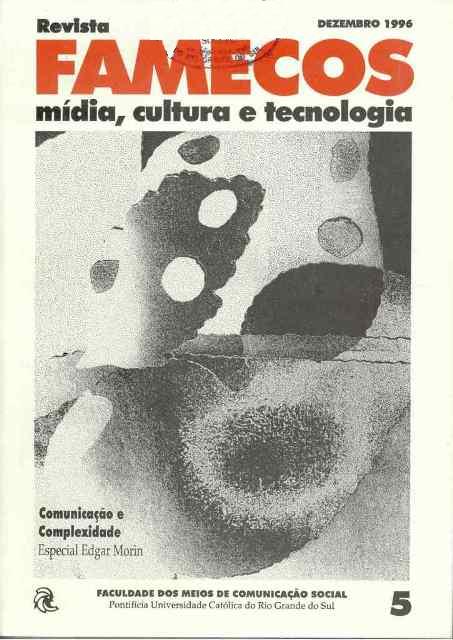O conceito marxista de ideologia nos estudos de mídia britânicos
DOI:
https://doi.org/10.15448/1980-3729.1996.5.2945Palavras-chave:
Comunicação, ideologia, marxismoResumo
O conceito de ideologia tem sido descrito na literatura como um conceito vago, escorregadio e, para alguns, ‘inútil’ (Frazer,1988). Como bem coloca McLellan ‘ideologia é o mais elusivo conceito dentro das ciências sociais... essencialmente um conceito contestado, isto é, um conceito sobre o qual existe controvérsia em termos de sua própria definição e aplicação.’ (McLellan, 1986: 1).
Downloads
Referências
ALTHUSSER, L. Essays on Ideology. Londres: Verso, 1984.
BENNETT,T. Theories of the media, theories of society. In: GUREVITCH, M; CURRAN, J. e WOLLACOTT, J. (eds.). Culture, Society and the Media. Londres: Methuen, 1982.
CURRAN, J. The new Revisionism in mass communications research: a re-appraisal. European Jornal of Communication, n. 5, p. 135-164, 1990.
CURRAN, J.; GUREVITCH, M. e WOOLLACOTT, J. The study of the media: theoretical approaches. In: Body-Barreto, O. and Braham, P. (eds.). Media, Knowledge and Power. Milton Keynes: Open University Press, 1987.
CURRAN, J. and SEATON, J. Power Without Responsability; the press and broadcasting in Britain. Londres: Fontana, 1994.
FORGACS, D. Gramsci and Marxism in Britain. New Left Review, v. 176, p. 70-88, 1989.
FRAZER, E. Talking about Feminity: the concept of ideology on trial. Tese de doutorado não publicada, Universidade de Oxford, 1988.
GARNHAM, N. Towards a political economy of culture. In: New Universities Quartely, v. 31, n. 3, p. 341-57, 1977.
_____. ’Contribution to a political economy of mass communication’. Media, Culture and Society, 1:123-46. 1979.
_____. Raymond Williams, 1921-1988: a Cultural analyst, a distinctive tradition. Journal of Communication, v. 38, n. 4, 1988.
GERAS, N. Post-Marxism? In: New Left Review, v. 163, May-June, p. 40-82, 1987.
GOLDING, P. and MURDOCK, G. Ideology and the mass media: the question of determination. In: BARRET, M,. et al. Ideology and Cultural Production. Londres: Croon Helm, 1979.
GRAMSCI, A. Selections from Prision Notebook. Londres: Routledge, 1971.
HALL, S. Television as a Medium and its Relations to Culture. CCCS Occasional Paper, Birmingham, 1975.
HALL, S. Encoding and decoding. In: Culture, Media and Language. Londres: Hutchinson, 1980.
HALL, S. Thatcherism amongst the theorists: toad in the garden. In: C., Nelson and GROSSBERG, L. Marxism and Interpretation of Culture. Londres: Macmillan, 1988.
HALL, S. et. al. (eds.). Policing the Crisis: Mugging, the State and the Law and Order. Londres: Macmillan, 1978.
JOHNSON, R. Histories of culture / theories of ideology: notes on an impasse. In: BARRET, M.; LACLAU, E. and MOUFFE, C. Politics and Ideology in Marxist Theory. Londres: Verso, 1976.
LARRAIN, J. The concept of Ideology. Londres: Hutchinson, 1979.
MARX, K. and ENGELS, F. The German Ideology. Londres: Lawrence & Wishart, 1970.
McLELLAN, D. Ideology. Milton Keynes: Open University, 1986.
MURDOCK, G. Redrawing the map of the communications industries: concentration and ownership in the era of privatisation. In: Ferguson, M. (ed.). Public Communications: The new imperatives. Londres: Sage, 1990.
MURDOCK, G. Across the great divide: cultural analysis and the condition of democracy. Critical Studies in Mass Communication, v. 12, p. 89-95, 1995.
MURDOCK, G. e GOLDING, P. Capitalism, communication and class relations. In: Mass Communication and Society. Milton Keynes: Open University Press, 1977.
RANSOME, P. Antonio Gramsci: a new introduction. Hemel Hempstead: Harvester Wheatsheaf, 1992.
WILLIAMS, R. Culture and Society (1780-1950). Harmondsworth, Penguin, 1961.
_____. Marxism and Literature. Oxford: Oxford University Press, 1979.
_____. Culture. Londres: Fontana, 1982.
Downloads
Publicado
Como Citar
Edição
Seção
Licença
Direitos Autorais
A submissão de originais para a Revista Famecos implica na transferência, pelos autores, dos direitos de publicação. Os direitos autorais para os artigos publicados nesta revista são do autor, com direitos da revista sobre a primeira publicação. Os autores somente poderão utilizar os mesmos resultados em outras publicações indicando claramente a Revista Famecos como o meio da publicação original.
Licença Creative Commons
Exceto onde especificado diferentemente, aplicam-se à matéria publicada neste periódico os termos de uma licença Creative Commons Atribuição 4.0 Internacional, que permite o uso irrestrito, a distribuição e a reprodução em qualquer meio desde que a publicação original seja corretamente citada.






